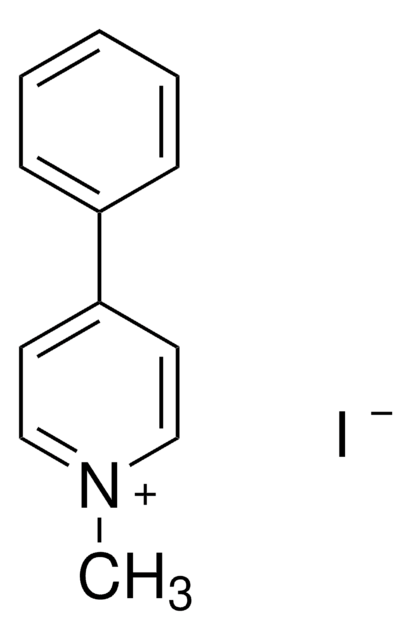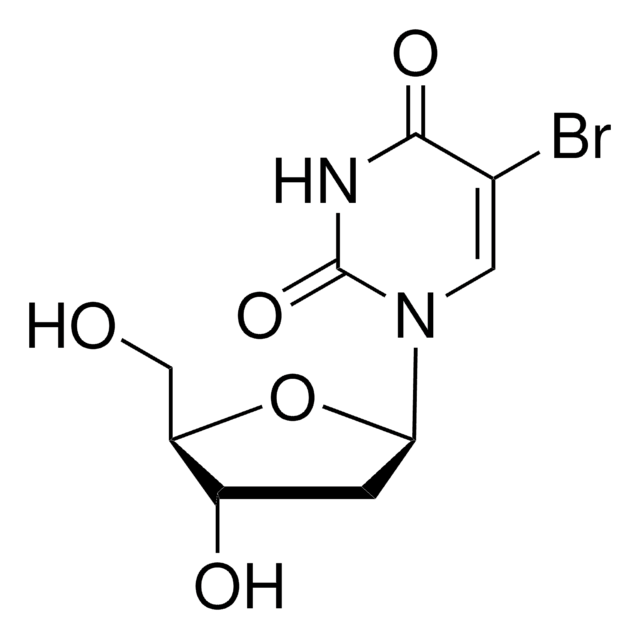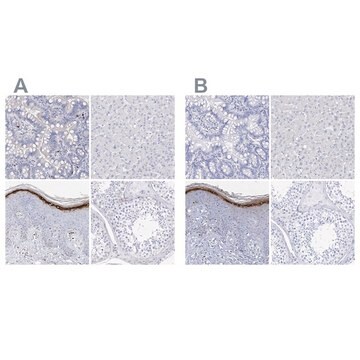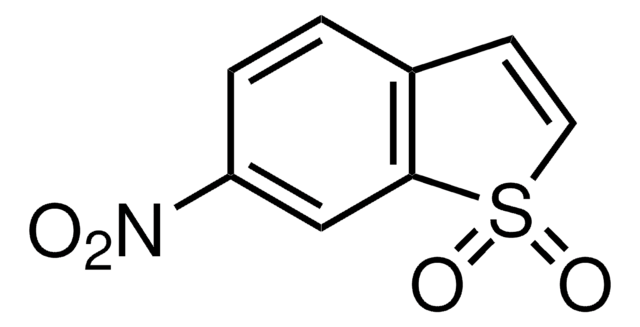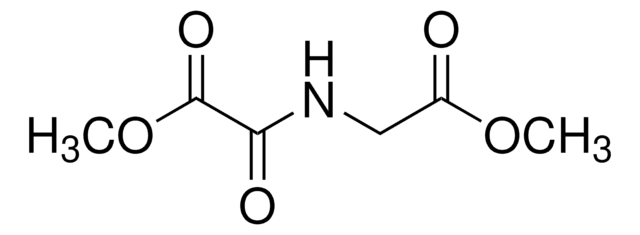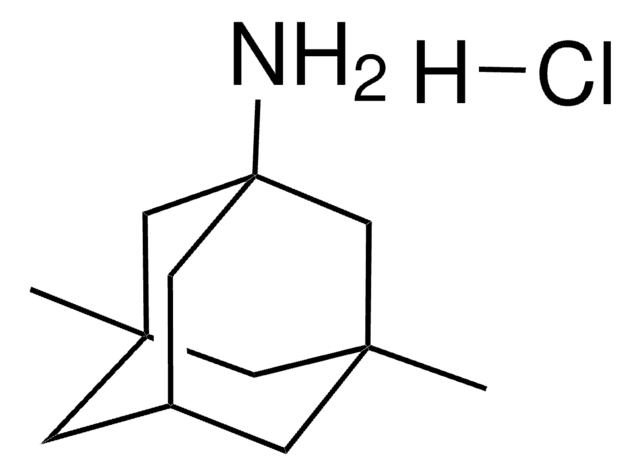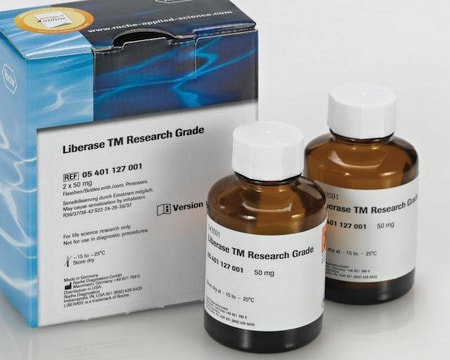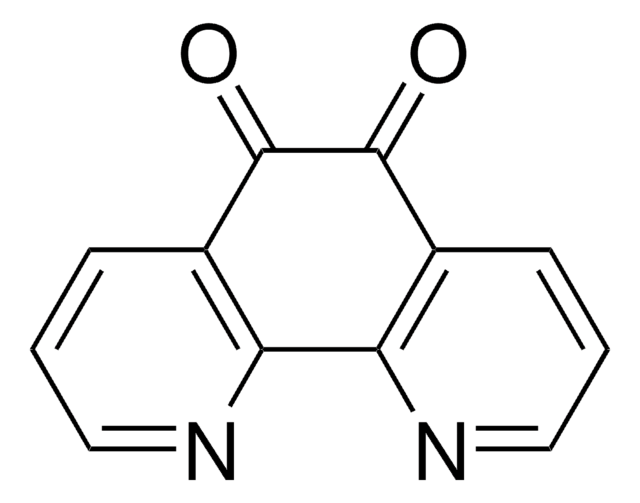D5314
DPQ
≥98% (HPLC), solid
Synonym(e):
3,4-Dihydro-5-[4-(1-piperidinyl)butoxyl]-1(2H)-isoquinolinone
Anmeldenzur Ansicht organisationsspezifischer und vertraglich vereinbarter Preise
Alle Fotos(1)
About This Item
Empirische Formel (Hill-System):
C18H26N2O2
CAS-Nummer:
Molekulargewicht:
302.41
MDL-Nummer:
UNSPSC-Code:
12352200
NACRES:
NA.77
Empfohlene Produkte
Biologische Quelle
synthetic (organic)
Qualitätsniveau
Assay
≥98% (HPLC)
Form
solid
mp (Schmelzpunkt)
107-109 °C
Löslichkeit
DMSO: 1 mg/mL, clear, colorless to faintly yellow
Lagertemp.
2-8°C
InChI
1S/C18H26N2O2/c21-18-16-7-6-8-17(15(16)9-10-19-18)22-14-5-4-13-20-11-2-1-3-12-20/h6-8H,1-5,9-14H2,(H,19,21)
InChIKey
RVOUDNBEIXGHJY-UHFFFAOYSA-N
Anwendung
DPQ has been used as a PARP1 (poly(ADP-ribose) polymerase 1) inhibitor in in vivo studies to determine the loss of γ-H2AX (H2A histone family member X) upon irradiation.
Biochem./physiol. Wirkung
3,4-Dihydro-5-[4-(1-piperidinyl)butoxyl]-1(2H)-isoquinolinone (DPQ) is known to decrease the PARP 1 (poly(ADP-ribose) polymerase 1) mediated apoptosis under the influence of ischemia. It is considered as more effective inhibitor than the traditionally used PARP1 inhibitor 3-aminobenzamide.
DPQ is a very potent poly(ADP-ribose) polymerase (PARP) inhibitor.
Lagerklassenschlüssel
11 - Combustible Solids
WGK
WGK 3
Persönliche Schutzausrüstung
dust mask type N95 (US), Eyeshields, Gloves
Hier finden Sie alle aktuellen Versionen:
Besitzen Sie dieses Produkt bereits?
In der Dokumentenbibliothek finden Sie die Dokumentation zu den Produkten, die Sie kürzlich erworben haben.
Kunden haben sich ebenfalls angesehen
Parp1-XRCC1 and the repair of DNA double strand breaks in mouse round spermatids
Ahmed EA, et al.
Mutation Research, 683(1), 84-90 (2010)
Ujval Anilkumar et al.
PloS one, 12(11), e0188343-e0188343 (2017-11-18)
Cell death induced by excessive glutamate receptor overactivation, excitotoxicity, has been implicated in several acute and chronic neurological disorders. While numerous studies have demonstrated the contribution of biochemically and genetically activated cell death pathways in excitotoxic injury, the factors mediating
M J Suto et al.
Anti-cancer drug design, 6(2), 107-117 (1991-05-01)
A series of dihydroisoquinolinones, formally rigid analogs of 3-substituted benzamides, and a series of 2,3-disubstituted benzamides were synthesized and evaluated as inhibitors of poly(ADP-ribose) polymerase. The results indicated that the orientation of the amide with respect to the substituent on
Advances in Neonatal Care : Official Journal of the National Association of Neonatal Nurses, 29-29 (2012)
M J Eliasson et al.
Nature medicine, 3(10), 1089-1095 (1997-10-23)
Nitric oxide (NO) and peroxynitrite, formed from NO and superoxide anion, have been implicated as mediators of neuronal damage following focal ischemia, but their molecular targets have not been defined. One candidate pathway is DNA damage leading to activation of
Unser Team von Wissenschaftlern verfügt über Erfahrung in allen Forschungsbereichen einschließlich Life Science, Materialwissenschaften, chemischer Synthese, Chromatographie, Analytik und vielen mehr..
Setzen Sie sich mit dem technischen Dienst in Verbindung.

